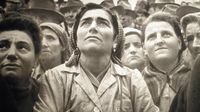On April 25, 2025, Italy will commemorate the 80th anniversary of its Liberation from Nazism and Fascism, a significant moment in its history. This national holiday, known as the Festa della Liberazione, symbolizes the end of Nazi occupation and the fall of Fascism, marking a collective effort of various groups that fought against oppression.
Aldo Cazzullo, a prominent Italian journalist, reflects on the diverse individuals who participated in the Resistance, emphasizing that it was not merely a partisan movement but a collective struggle involving young people from different political backgrounds, soldiers, civilians, women, and even Italian military internees in German camps who refused to fight for the Nazis. "It was a collective motion," Cazzullo asserts, highlighting the unity among those who opposed tyranny.
April 25, 1945, is etched in history as the day Nazi and fascist soldiers began their withdrawal from major cities like Milan and Turin. The Liberation Day was officially established on April 22, 1946, when the provisional Italian government, led by Alcide De Gasperi, declared it a national holiday. This designation was later cemented by Law No. 269 in May 1949.
However, it is essential to note that the war did not conclude on this date. Fighting continued until early May 1945, as the Allies pushed forward with their final offensive. In the months leading to the Liberation, thousands of partisans were actively engaged in combat against the occupying forces in northern Italy.
In March 1945, as the Allied forces intensified their advance, many German soldiers sought to resist. The Communist Party of Italy responded by issuing Directive No. 16 on April 10, 1945, calling for a definitive attack against the Nazis. This was followed by the National Liberation Committee for Upper Italy (CLNAI) proclaiming a general insurrection, urging all partisan forces to rise against the fascists and Germans. Cities like Bologna saw significant action, with partisans liberating it by April 21, 1945.
On April 24, 1945, a general strike was declared in Milan, announced by Sandro Pertini, a future president of Italy and then a partisan leader. This strike marked a pivotal moment in the fight for liberation, as factories were occupied and the press was utilized to disseminate news of the victory.
As the situation intensified, Benito Mussolini fled Milan for Como on the evening of April 25, only to be captured and executed two days later. By May 1, 1945, American troops arrived in Milan, marking a significant moment in the city's liberation.
This year’s celebrations will be particularly poignant, as they coincide with a national mourning period for the passing of Pope Francis. Across Italy, public squares will host parades, cultural initiatives, and events to honor the heroes of the Resistance. These gatherings will serve as a reminder of the sacrifices made by countless individuals who fought for freedom.
The significance of the day is underscored by the various political factions involved in the Resistance, from the Garibaldi Brigades (Communist) to the Matteotti (Socialist) and the Justice and Freedom groups. Each played a crucial role in the collective effort to liberate Italy from fascist rule.
One of the most enduring symbols of this struggle is the song "Bella ciao," a folk anthem dedicated to the Italian Resistance. Its lyrics resonate with themes of sacrifice and freedom, making it a powerful reminder of the fight against oppression. The song’s iconic line, "E questo è il fiore del partigiano morto per la libertà," refers to the poppy, a flower that symbolizes the blood shed by those who fought for liberty.
As Italy prepares for this significant anniversary, the message of unity and resilience against tyranny remains relevant. The 80th anniversary of Liberation serves not only as a commemoration of past struggles but also as a reminder of the ongoing fight for justice and freedom in the present.
In reflecting on this day, it is vital to recognize the diverse voices and experiences that shaped the Resistance. The courage exhibited by those who stood against oppression continues to inspire generations, reminding us that the fight for freedom is a collective endeavor.
Ultimately, April 25 will not only honor the past but also encourage a renewed commitment to uphold the values of democracy and human rights. As people gather to remember the sacrifices made for liberation, they will also reaffirm their dedication to ensuring that the lessons of history are not forgotten.





